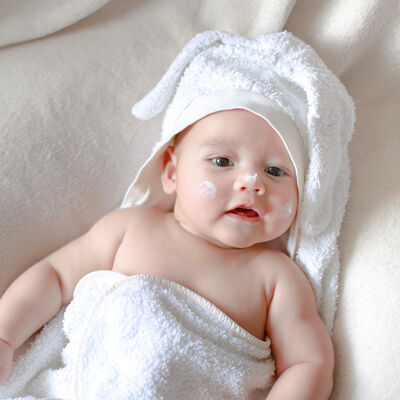
Understanding Baby Skin: How It Differs from Adult Skin
A baby’s skin is uniquely sensitive and structurally different from adult skin, making it more prone to dryness, rashes, and irritation. Its protective barrier is thinner, more permeable, and easily disrupted, which is why understanding these differences is vital for proper care. Choosing dermatologist-recommended newborn skincare products, such as Cetaphil, ensures hydration, gentle cleansing, and protection without harsh chemicals or fragrances. Unlike adult products, these formulations are designed specifically to safeguard fragile skin. This guide explores key differences between baby and adult skin, their significance, and practical ways to maintain your baby’s skin soft, healthy, and well-protected daily.

What Makes Baby Skin Unique?
There are unique features of baby skin that make it different from adult skin. These differences are known to facilitate the selection of appropriate newborn skin care products.
Structurally Different Layers
● Baby skin is more delicate and it is mostly thinner, especially the epidermis, as compared to that of adults.
● The outer protective layer is the stratum corneum, which is less dense and is also more permeable to the skin.
● This structural variation causes infants to be vulnerable to loss of moisture and irritation.
The Role of Vernix Caseosa
● At birth, the newborn has a natural coating known as Vernix caseosa that is waxy in nature.
● It serves to shield and protect water and seal off infection.
● The vernix can be washed away using newborn skin care products that do not tamper with the natural balance of the skin.
High Water Content
● The water content is greater in the skin of the babies, thereby making the skin soft and plump.
● This, however, increases its susceptibility to dehydration unless it is properly moisturized using the best newborn skin care products.
● The main factor to a healthy skin barrier is hydration.
How Baby Skin Functions Differently
Functional properties of the baby's skin differ greatly from those of adults and influence its responses to products and environmental factors.
Sebum Production Levels
● The newborns also produce less sebum, which is the natural oil that keeps the skin moist and preserved.
● Lack of sebum exposes the skin to lower irritants and drying.
● Gentle moisturizers and child skin products are used to counter this natural deficiency.
Immature Sweat Glands
● The glands of babies are immature, hence making them less efficient in temperature control and in releasing toxins.
● This renders overheating or excessive sun exposure dangerous.
● Protective quality clothes and skin care products that are used on babies are needed.
Why Baby Skin Requires Special Care
Baby skin is very sensitive and developing, thus requiring special care.
Increased Sensitivity to Irritants
● Chemicals, fragrances, detergents, and environmental pollutants have a very easy time getting onto baby skin.
● Using the recommended products by dermatologists will mean exposure to a few irritants.
● Frequent application of mild cleansers and moisturizers keeps the skin intact.
Importance of pH Balance
● The pH of baby skin is a bit higher than that of adults, and thus is exposed to infections and irritation.
● Rashes can be avoided, and the skin's protective barrier can be preserved by using newborn skin care products that are designed using a balanced pH.
● PH-neutral products are also favorable to the healthy microbiota of the skin.
Baby Skin Care Best Practices
Using regular skincare with the right products helps to develop healthy skin.
Gentle Cleansing Techniques
● Wash with a non-scented, lightweight baby soap or mild cleansers that are designed for babies.
● Do not wash too much because it may remove natural oils.
● Avoid rubbing to dry the skin, but pat it dry to avoid micro-tears and irritation.
Moisturizing Essentials
● Use mild, non-allergenic moisturizers as soon as you get out of the bath to seal in the moisture.
● Pay attention to the parts that are likely to get dry, like the elbows, knees, and cheeks.
● Select the most appropriate newborn skin care products that are based on sensitive skin.
Protection from Sun Exposure
● Infants below 6 months should not be exposed to the direct sun.
● Wear light clothes and hats as protection.
● In the case of babies above six months of age, be sure to use the baby-safe, dermatologist-recommended sunscreen to avoid UV damage.
Conclusion
It is important to know the structural and functional variations of baby skin to take proper care. The skin of a baby is delicate and sensitive, and should be given special products for newborn skin care to maintain good health.
● Apply mild cleaners and oils to preserve the skin barrier.
● Do not use harsh chemicals and fragrances, which may be irritating.
● Be well hydrated and shielded against environmental stressors.
● Trust the dermatologist-recommended items, such as Cetaphil newborn skin care products, as they are safe and effective.
The Cetaphil AI Skin Analysis Tool is used to provide a personalized product recommendation according to your skin type.
FAQs
How does baby skin change as they grow?
Baby skin gradually thickens, sebum production increases, and sweat glands mature. These changes enhance moisture retention, barrier function, and tolerance to environmental factors, reducing sensitivity over time.
What are the signs of a skin allergy in babies?
Redness, rashes, itching, hives, and swelling indicate a potential skin allergy. Persistent irritation or unusual reactions to products should be evaluated by a pediatric dermatologist.
Are natural baby skin care products better?
Natural products can be gentle, but always choose dermatologist-approved formulations. Avoid essential oils, harsh fragrances, or untested ingredients that may irritate sensitive baby skin.
Can weather changes affect my baby's skin?
Yes, cold, dry, or humid weather can impact hydration and sensitivity. Adjust baby skin care products accordingly, increasing moisturization or protective measures as needed.
How do I recognize a safe skincare product for my baby?
Look for dermatologist-recommended, hypoallergenic, fragrance-free, and pH-balanced products designed for newborns. Cetaphil newborn skin care products are formulated to protect delicate skin effectively.














